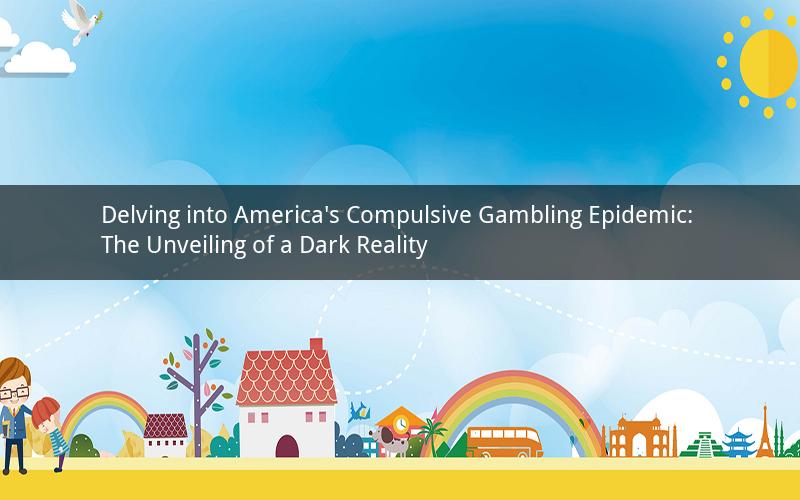
America's gambling problem is a pervasive issue that has been overshadowed by the glitz and glamour of casinos and betting shops. This article explores the extent of the problem, its consequences, and the ongoing efforts to combat it. The question remains: How bad is America's gambling problem?
The Scope of America's Gambling Problem
Gambling has been a part of American culture for centuries, with states legalizing various forms of gambling to generate revenue. However, this has also led to an alarming increase in the number of people struggling with gambling addiction. According to the National Council on Problem Gambling, an estimated 2-3% of American adults meet the criteria for problem gambling, while 1-2% are considered to have a severe gambling disorder.
The allure of easy money and the thrill of winning have enticed millions of Americans to try their luck at casinos, racetracks, and online platforms. With the advent of technology, gambling has become more accessible than ever before, with people able to place bets from the comfort of their own homes. This has contributed to the rapid growth of the gambling industry, which is now valued at over $100 billion annually.
The Consequences of Compulsive Gambling
The repercussions of America's gambling problem are far-reaching, affecting individuals, families, and communities. Compulsive gamblers often experience severe financial distress, with many losing their homes, cars, and savings. This can lead to increased levels of debt, bankruptcy, and even homelessness.
Moreover, gambling addiction can have devastating effects on personal relationships. Spouses and children of compulsive gamblers often bear the brunt of the consequences, suffering from emotional abuse, financial strain, and the loss of a stable home environment. The cycle of addiction can also lead to other mental health issues, such as depression, anxiety, and substance abuse.
The social costs of gambling addiction are also significant. Communities impacted by compulsive gamblers may see an increase in crime rates, as individuals turn to illegal activities to fund their gambling habits. Additionally, the strain on public services, such as healthcare and law enforcement, can become overwhelming.
Efforts to Combat America's Gambling Problem
In response to the growing gambling crisis, numerous organizations and initiatives have been established to help those affected by compulsive gambling. Some of these efforts include:
1. Counseling and Support Groups: Many organizations offer free or low-cost counseling services for individuals struggling with gambling addiction. Support groups, such as Gamblers Anonymous, provide a safe and supportive environment for people to share their experiences and seek guidance.
2. Education and Awareness Campaigns: By educating the public about the risks and consequences of gambling, these campaigns aim to prevent problem gambling from developing. Many organizations, such as the National Council on Problem Gambling, provide resources and tools to help individuals make informed decisions about their gambling habits.
3. Responsible Gambling Policies: Some states have implemented policies to regulate the gambling industry, including setting deposit limits, banning credit betting, and promoting responsible gambling messages. These measures aim to reduce the potential for harm and encourage responsible gambling behavior.
4. Research and Data Collection: By collecting data on gambling patterns and outcomes, researchers can better understand the scope of the problem and develop effective strategies to combat it. The National Council on Problem Gambling conducts ongoing research to inform policy and practice.
5. Treatment and Intervention Programs: Various treatment options are available for individuals struggling with gambling addiction, including inpatient and outpatient rehabilitation programs, cognitive-behavioral therapy, and medication.
Frequently Asked Questions
1. How does compulsive gambling affect individuals financially?
Compulsive gamblers often experience severe financial distress, including the loss of homes, cars, and savings. They may accumulate substantial debt and even turn to illegal activities to fund their gambling habits.
2. Can children of compulsive gamblers be affected by the addiction?
Yes, children of compulsive gamblers are at risk of experiencing a range of negative effects, including emotional abuse, financial strain, and the loss of a stable home environment.
3. What are the most effective treatments for gambling addiction?
The most effective treatments for gambling addiction often involve a combination of counseling, support groups, and cognitive-behavioral therapy. In some cases, medication may also be prescribed.
4. How can I identify if someone is struggling with a gambling addiction?
Signs of a gambling addiction include secrecy about gambling habits, neglecting personal responsibilities, borrowing money to fund gambling, and experiencing emotional or physical health issues.
5. Are there any legal measures to combat gambling addiction?
Yes, some states have implemented policies to regulate the gambling industry, including setting deposit limits, banning credit betting, and promoting responsible gambling messages. Additionally, many organizations offer resources and support for individuals struggling with gambling addiction.
In conclusion, America's gambling problem is a significant and complex issue that requires a multifaceted approach to address. By understanding the scope of the problem, its consequences, and the available resources for support, individuals, families, and communities can work together to combat this dark reality.